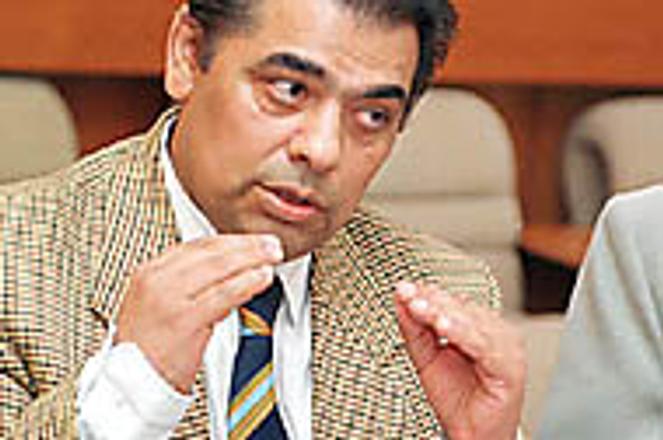Cabinet appointee for the Roma Vincent Danihel was fired last week.photo: TASR
Although ostensibly fired for his lack of English skills (among other reasons), Cabinet Plenipotentiary for Solving Roma Issues Vincent Danihel had little difficulty reading the writing on the wall. Contacted by The Slovak Spectator on May 3, he refused to answer questions about his future, saying that he would grant a full interview "as soon as I'm recalled. Just wait a week or two."
Six days later Danihel was indeed fired after a two year tenure in the post. Deputy Prime Minister for Minority Rights Pál Csáky, Danihel's direct boss, said that the plenipotentiary had been sacked because he lacked support among the Roma and because he had achieved poor results in his main task - solving some of the worst problems affecting the Roma, one of Slovakia's largest minority populations.
"I thought he'd be able to address the Roma elite and the larger community," Csáky said afterwards. "It's a pity, but this never happened."
Danihel, whose office had a staff of 11, had been tasked with evaluating projects to improve standards of living among Slovak Roma, and then submitting recommendations to Csáky to receive official approval and funding. He was also expected himself to prepare projects, and to be a regular intermediary between Csáky and the Roma. In both of these areas, Csáky said, Danihel had disappointed his government masters.
Slovakia's Roma, who number from 300,000 to 500,000 according to various estimates, are subject to far higher jobless rates than the Slovak average (over 20%), tend to live in sub-standard housing isolated from the Slovak majority, to be less educated and to experience higher mortality and disease rates. These conditions, and the racism that the Roma say they face daily from their white compatriots, have precipitated several waves of migration to western Europe, beginning in 1997, where the Roma have demanded political asylum. Western European governments have told Slovakia that addressing its 'Roma problem' is key to the country's ambitions to enter the European Union in 2004.
Not going gentle
Danihel's dismissal was neither clean nor painless. Csáky said that Danihel had been involved in "attempts to misuse his powers as a state bureaucrat, which he did several times." When pressed for details, however, Csáky refused comment. Danihel, for his part, accused his former boss of mishandling World Bank funds worth $280,000, saying that Csáky had used the money instead to finance activities not associated with minority projects.
Csáky's final complaint with Danihel was that the latter had been a poor communicator with the European Union bodies he had been expected to deal with, as he spoke no foreign languages.
"This I admit," said Danihel May 14. "I don't speak English. But apart from that I was the perfect representative of Slovakia abroad.
"But this [his recall] is yesterday's news, it's no longer interesting for anyone. The government nominated me to the post, and the government has a right to recall me. I respect that."
Little support
Danihel's departure was hastened by the fact that he had little support either at home or abroad. Ross Pavis, the head of a World Bank grant team for eastern Europe and middle Asia, sent a letter to Csáky May 10 in which he wrote that he supported the recall of Danihel.
Pavis said that he hoped the replacement would be "more effective, a [plenipotentiary] which will be better equipped to react to the many problems it has to deal with."
Others were more critical. Gejza Adam, the head of the Roma Civil Initiative (ROI) political party and one of Danihel's fiercest critics, said that "Danihel should have been recalled a long time ago".
"He had no support among the Roma," Adam said. "The Roma are indifferent at best and get angry at worst when they hear his name today. We haven't seen any improvement in Roma life. Danihel did not keep in touch with the Roma, and he gradually distanced himself from our problems."
Danihel called Adam's statements "pure lies. Just mention my name and you'll see full auditoriums of Roma eager to hear me speak."
But Klára Orgovánová, a Roma activist and head of the independent NGO Inforoma, also blamed Danihel for making little headway with fixing Roma problems, although she added that as an ethnic Roma Danihel had been saddled with unrealistic expectations that he would quickly solve a complicated issue.
"Too much was expected of Danihel because he was an ethnic Roma named to the plenipotentiary post," she said. "Yes, he could have done more with his power, but on the other hand, many Roma had unreal expectations of him."
She added that Csáky was equally to blame. "Danihel did not have daily contact with Csáky, thus misunderstandings between the two grew bigger partly due to their lack of communication. An improvement in this sphere is expected as well."
Replacement tender
On May 15, three Slovak dailies ran half page announcements, printed in both Slovak and Roma languages, of a tender for a new cabinet plenipotentiary.
According to the advert, candidates must have a university degree, five years managerial experience, knowledge of and contacts within the Roma community, work experience in state or third sectors, and English language skills.
Expecting application letters by May 25, Csáky said interviews would begin at the beginning of June, with cabinet making a decision by the end of June.

